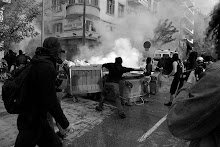The democratic ideal of participation finds expression in the widespread voicing of opinion. Everyone must have an opinion, a pre-masticated mishmash which remains separate from the will and consequently the decision or capacity to act on one’s life. You can find one on any street corner, shrink-wrapped and readily available from a number of well-established suppliers. Distribution is taken care of by the media, the source of the animated pub talk that jumps from the current war to the next football match or latest serial killer in the time it takes to down a pint. From the cubital headings of the tabloids to the more discreet forms of the ‘serious’ dailies, from the ‘informative’ TV channels to the repetitive condensations from the satellite dishes, just enough significant information is supplied to keep people chattering and, if not turning up to vote at the next elections, at least remaining within the paradigms of the democratic management of dominion.
At the other end of the spectrum there is the ever-widening area of the politically correct, those who inform themselves from well-documented sources and have become an indispensable pole as the moral upholders of the right to express an opinion that is different—so long as it does not go beyond that. In this semantic desert, relationships based on knowledge of each other are impossible. Differences (the basis for affinity) are veiled within the great circus of identities. The most profound relationship one can reach is a kind of camaraderie in the generic affirmation of the right to exist and not be harrassed or offended. Thought is replaced by a carefully codified verbal exchange mined with inbuilt inhibitory factors which reduce it to the lowest common denominator where the only concrete prospect beyond the chatter is of things staying as they are.
In this compendium of trivia an idea is an unwelcome intruder. It cannot slip unobtrusively into the grammar of tolerance, does not fit into the binary logic of data, is not immediately comprehensible and above all is not politically correct. Taking root in the turmoil of reality far from the desert of the ready-made, it does not hold other people’s territory in timorous respect, but is the expression of individuals in search of affinity in their desire to act expansively and passionately in the world.
Subscribe to:
Post Comments (Atom)




No comments:
Post a Comment